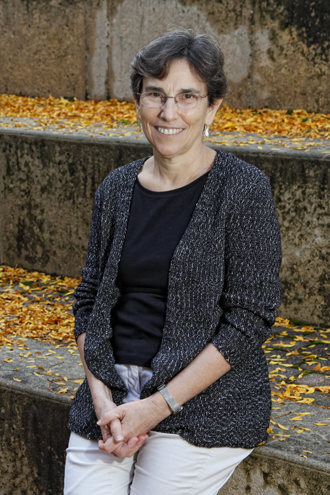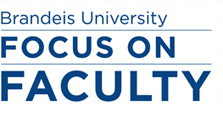Charney makes it all add up
Mathematician (and former dancer) wants to multiply women in math
 Photo/Mike Lovett
Photo/Mike LovettProfessor Ruth Charney
Professor Ruth Charney ’72 prefers the strange stuff.
When it comes to dance, she likes it modern and improvisational. When it comes to math, she’ll take it highly theoretical. When it comes to women in mathematics — well, that shouldn’t be strange at all.
Charney has long been an advocate for women in math and earlier this year was elected president of the Association for Women in Mathematics (AWM), an organization that empowers, connects and supports women in the field. The AWM runs conferences, workshops and networking events for all levels of mathematics, from K-12 to postdoctoral.
Female mathematicians have broken into the field long dominated by men. Today, women make up about 25 percent of PhD candidates. However, that number drops significantly at the assistant- and full-professorship levels.
“It is so important for women to feel they are not isolated in mathematics,” Charney says. “It makes a huge difference when we can network with one another, share experiences and build relationships.”
Charney witnessed firsthand what happens when young mathematicians feel unwelcome. As a young professor at Ohio State University, Charney watched as many female students avoided honors classes or dropped out of graduate school, despite performing well on tests and assignments.
“These were students who were outperforming many of their male classmates but they still felt they weren’t good enough,” Charney says. “That really bothered me.”
 |
It was particularly troublesome because her own experience as a student fell on the other end of the spectrum. Though she was one of only a few female math majors at Brandeis in the 1970s, Charney felt supported and encouraged by her professors and classmates. At Princeton for a PhD — after spending a year studying modern dance at the avant-garde Merce Cunningham Dance Studio in New York City — Charney says she was just one of the boys.
“I never thought that being a woman made me somehow different as a mathematician,” Charney says.
Charney’s field of study, geometric group theory — which uses geometry to understand algebraic sets — has attracted many female researchers. But Charney wants to make a difference across mathematics. She joined the AWM in the early 1990s and began mentoring young mathematicians.
Many women in the field suffer from impostor syndrome, the feeling of not being good enough, Charney says. Women can feel discouraged and isolated if there aren’t other people like them in the department or at conferences. A mentor can offer shared experiences, advice and confidence boosts.
“I fit in as a doctoral candidate because I owned only jeans and T-shirts,” she says. “But if someone wants to wear a dress or heels, she should be able to without feeling judged or inappropriate. Thankfully, that has improved since I was in graduate school.”
While some things are getting better, “until we are viewed as scientists, instead of ‘women in science,’ we have not achieved our goal,” Charney says.
Categories: Alumni, Science and Technology





